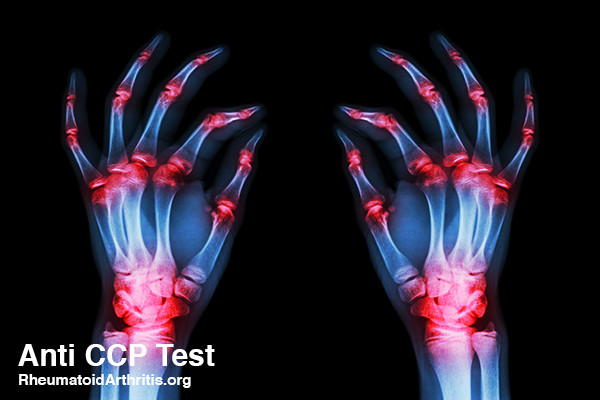Anti-CCP antibody Rheumatoid arthritis is both a common and chronic symptom, with significant consequences for multiple organ systems. A better understanding of its pathophysiology has led to the development of targeted therapies that have dramatically improved outcomes. The key to therapeutic success lies in identifying individuals who will have severe destructive diseases as early as possible so that effective treatment can be initiated before irreversible damage occurs.
Anti-cyclic citrullinated peptide (anti-CCP) antibody testing is particularly useful in the diagnosis of rheumatoid arthritis, with high specificity, presence early in the disease process, and the ability to identify patients who are likely to have severe disease and irreversible damage.
What is a CCP antibody test?
What is it used for?
An anti-CCPP antibody test is used to help diagnose rheumatoid arthritis. It’s often done along with or after a rheumatoid factor (RF) test. Rheumatoid factors are another type of autoantibody. RF tests used to be the main test to help diagnose rheumatoid arthritis. However, RF factors can be found in people with other autoimmune diseases and even in some healthy people.
Many studies have shown that CCP antibodies provide a more accurate diagnosis of rheumatoid arthritis compared with RF testing. Anti-CCP antibody assay is prescribed at the same time as or following an RA test (see this section) if a person shows signs or symptoms suggesting inflammatory arthritis. Signs and symptoms may include the following:
Why do I need a CCP antibody test?
You may need this test if you have symptoms of rheumatoid arthritis. These include:
- Joint Pain
- Joint stiffness, especially in the morning
- Joint swelling
- Painful, hot, and/or swollen joints, most often in the hands and wrists
- Occasional pain in the elbows, neck, shoulders, hips, knees and feet
- Stiffness in the joints when getting up in the morning, which decreases during the day
- Fatigue and fever
- The development of nodules under the skin, especially at the elbows
- A general feeling of discomfort
What does the test measure?
The cyclic citrullinated peptide antibody test identifies CCP antibodies in the blood. CCP antibodies are a specific type of antibody produced by the immune system called an autoantibody.
While most antibodies help the body fight disease by recognizing and neutralizing foreign substances like bacteria and viruses, autoantibodies don’t fulfill this important immune function. Instead, autoantibodies can act abnormally by targeting and attacking the body’s healthy cells and tissues.
CCP antibodies are detected in most patients with rheumatoid arthritis. Although less common, CCP antibodies may be detected in other autoimmune disorders, including Sjogren’s syndrome and lupus. Positive results for CCP antibodies can also occur in patients with active tuberculosis (TB) and some patients with chronic lung disease
What do the results mean?
Positive anti-CCP test + positive RA test:
Have signs or symptoms of arthritis, positive results in both the anti-CCP and RA tests are highly predictive of rheumatoid arthritis and you may develop a more progressive and severe form.
Positive anti-CCP test + negative RA test
Slightly positive anti-CCP test + slightly positive RA test
You have suggestive signs of rheumatoid arthritis and positive results in the anti-CCP test but negative results in the RA test, or if you are symptomatic with weak results in both tests, it is likely that you are in the early phase of the disease or that it will develop in the future.
Negative anti-CCP test + positive RA test
If you have negative results in the anti-CCP test but positive results in the RA test, the symptoms and clinical signs will determine the diagnosis of the disease.
Negative anti-CCP test + negative RA test
Your results are negative for both tests (anti-CCP and RA), the arthritis is likely due to a cause other than rheumatoid arthritis.
How Sensitive and Specific Is the Anti-CCP Test?

For rheumatoid arthritis, anti-CCP is not particularly sensitive — just 50 to 75 percent, depending on the study you look at. This means that around two-thirds of negative results would be “true negatives” (no RA diagnosis), but around a third of people with negative results actually might have RA after all. (More on this, which is known as seronegative rheumatoid arthritis, below.)
On the other hand, the CCP test is more than 90 percent specific, which means that less than 10 percent of people who test positive do not meet the criteria for rheumatoid arthritis. If you test positive for anti-CCP, it’s a good indication you likely have rheumatoid arthritis.
Reference Range
- < 20 EU/mL – Negative



[…] ESR test can help determine if you have a condition that causes inflammation. These include arthritis, vasculitis, or inflammatory bowel disease. An ESR may also be used to monitor an existing […]
[…] helps to tell the difference between rheumatoid arthritis and other types of arthritis, such as Anti-nuclear antibody (ANA), Anti CC Protein, ESR, and C Reactive Protein (CRP). Antibodies directed against the Fc […]
[…] ANA antinuclear antibody attack your own body, cells and tissue. ANA also called ANA antinuclear or FANA (fluorescent antinuclear antibody) because it target the nucleus, center of the cell. […]
Thank you for your articles. They are very helpful to me. May I ask you a question?
[…] ESR test can help determine if you have a condition that causes inflammation. These include arthritis, vasculitis, or inflammatory bowel disease. An ESR may also be used to monitor an existing […]
[…] Sjögren‘s syndrome, an autoimmune disease often associated with anti-ENA antibodies, can cause dryness of the mouth and eyes, leading to symptoms like dry mouth, dry eyes, and difficulty swallowing. […]
[…] the bacteria of Streptococcus, help diagnose complications resulting from a strep infection such as Rheumatoid fever, glomerulonephritis, or kidney disease. You may need an ASO Titer blood test if you have […]
[…] of vitamin D are measured by the 25-hydroxy level in nanomoles/liter (nmol/L) or nanograms/milliliter (ng/mL). The results can indicate the […]